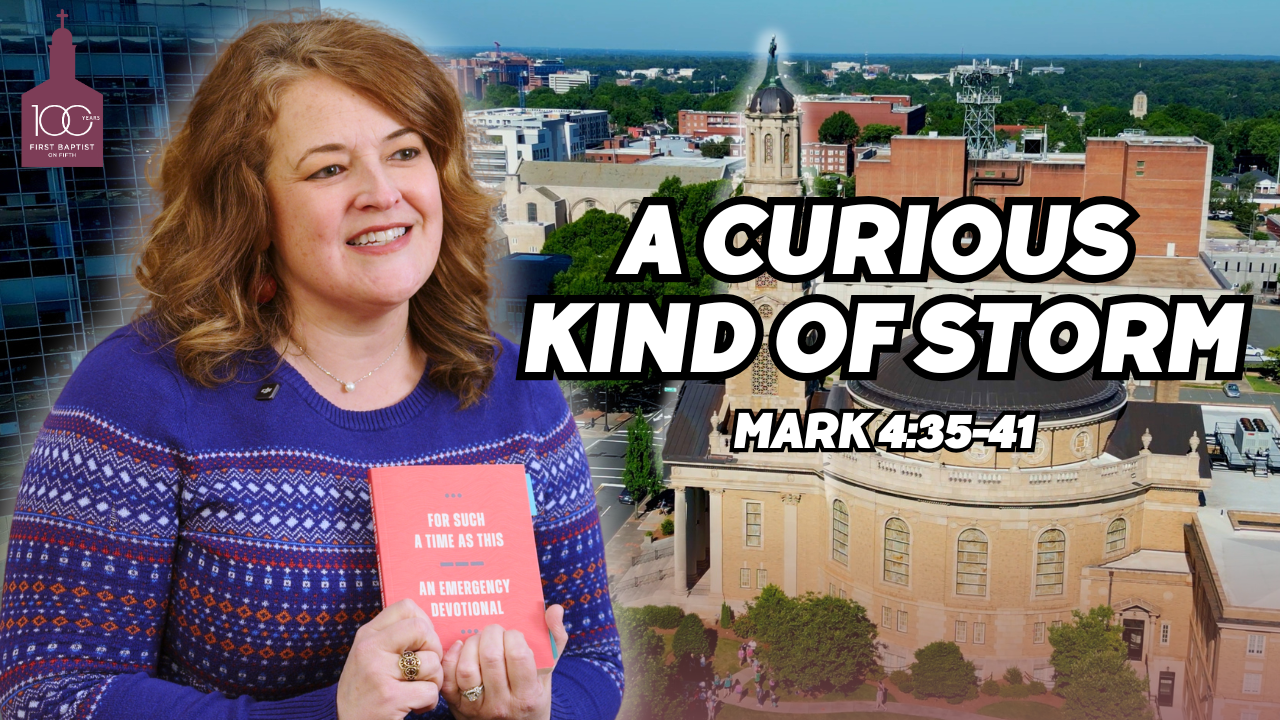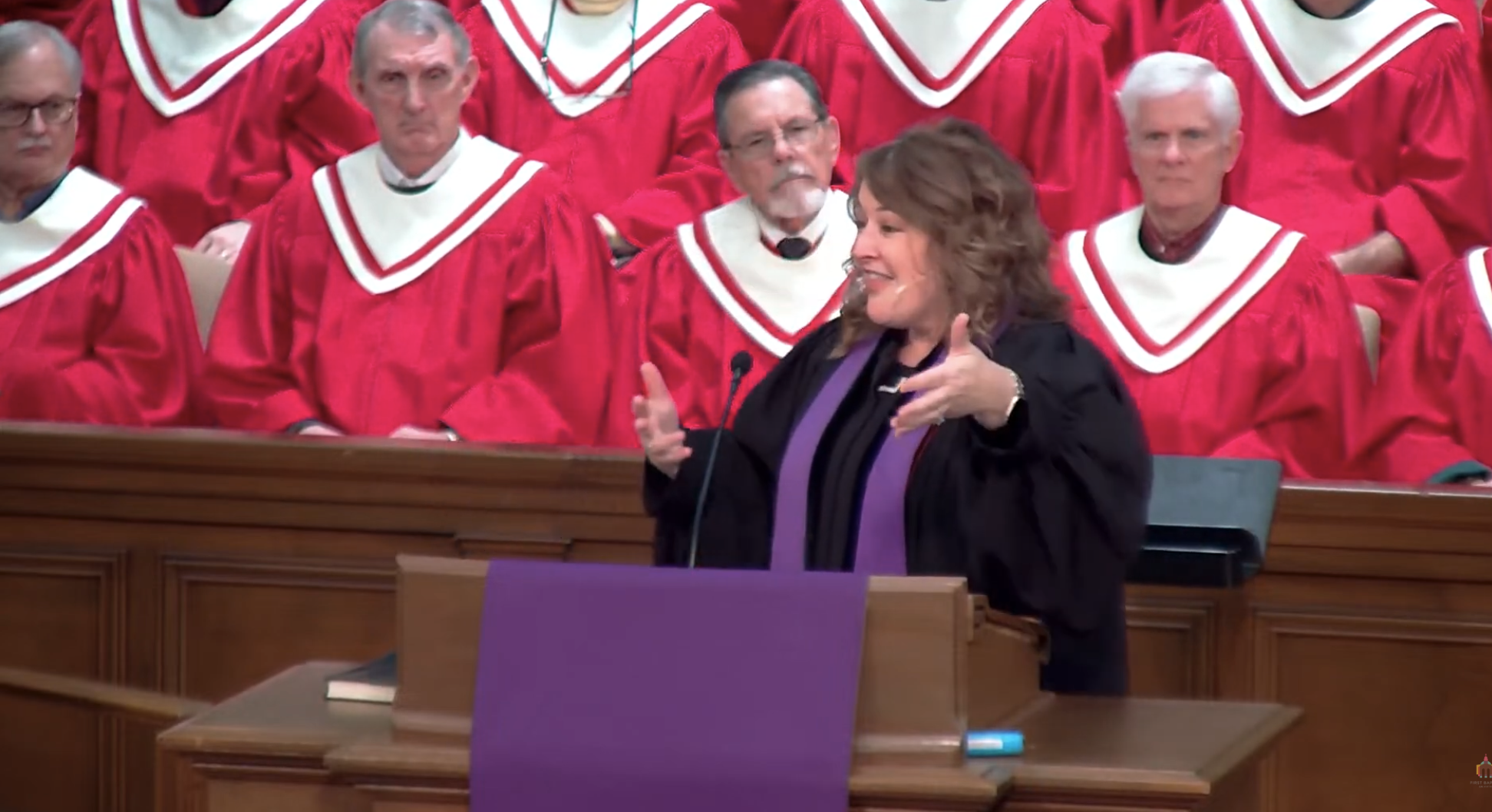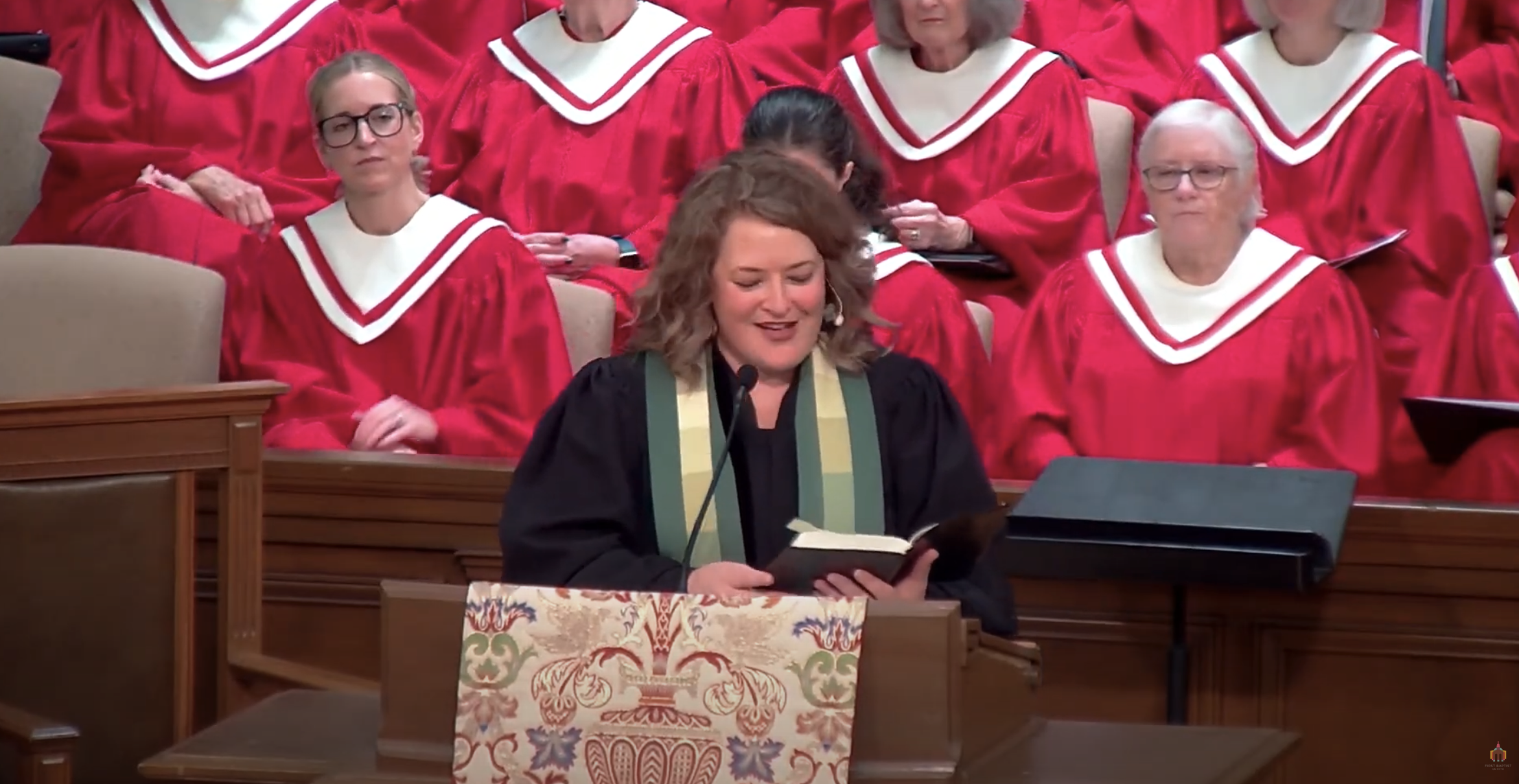I. If you’re one of the lucky ones who lives in Louisville, Kentucky, the first Saturday in May isn’t just Derby Day as you might imagine. Rather, it is also the day that you need to have your plants in the ground! The first Saturday in May is the day Louisvillians know the land is ready to receive new life. All around our world, as winter gives way to spring, we see people of all kinds outside, on the ground, planting and pruning and shedding off the isolation of winter. Perhaps you too still have dirt underneath your fingernails from doing some planting yourself!
II. As I shared with you last Sunday, when speaking of the world around us, we go back to where it began. From the first moments of creation, it was the land that God spoke into being, the land that then became site and source of life for creatures, the land that gave birth to humans. Humans from humus, encoding in our very flesh the soil that animates our life. From dust you are, to dust you shall return. The circle and cycle of life, birth and death, returning again and again to the Source. There in the garden, the Lord assigns tasks to the humans to “till and tend” – in the Hebrew, avad and shamar – meaning more literally, serving with reverence and respect as God’s creation, and watch it but also watch over it so that it can be kept and preserved.1
From Genesis to Psalms, we move into praise of that very land and the relationship shared. Psalm 104 is categorized as a creation psalm, one of many that, as Walter Brueggemann says, “reflects the coherence of life.”2 Of all the creation psalms, Psalm 104 is the longest and most extensive. We hear reflected in the psalm how the people of Israel understood their relationship with the created world and the God who spoke it into being. Again from Brueggemann, “the psalmist is smitten with the beauty, awesomeness, generativity, and ordered coherence of creation as guaranteed by the creator.”3“Field and forest, vale and mountain,” as we sang a few minutes ago echoing the psalm, and all within them belong to God, created by God, given by God, breathed by God’s spirit, in the fullness of God’s creative imagination.
III. Yet it is impossible to think theologically about the land in 2024 without naming our human abuses of it. We suffer from what Norman Wirzba and Fred Bahnson call “ecological amnesia,” a separating of people from the land either physically or existentially. Just two generations ago, they say, “most people worked on the land, drew their livelihood from it, and understood with the certainty of their stomachs that human life is inextricably intertwined with the health of fields, plants, forests, and animals…. [yet now] today’s urban and suburban life make it likely that people will not appreciate where their food and energy come from and what processes have been used to make them available. .. This is problematic because what people do not see and understand they will less likely value and protect.”4
So what happens? Our cheap food comes at the cost of the long-term health of our soil and water.5 The inexpensive coal we need to power our plugs shaves the tops off our mountains. Every eight hours, a species of plant or animal life becomes extinct because of humankind.6 When forests are plowed or logged, erosion rates soar, and nutrients are lost. Studies tell us that 3 billion tons of topsoil are lost annually to wind and water erosion, and though soil is naturally recreated, our erosion rate is such that we lose topsoil 10-20x faster than it’s replaced.7 When a country has more prisoners than farmers, we risk losing generations of knowledge and preservation. We don’t throw things “away,” because waste doesn’t disappear entirely even if from our view.8 Our use of energy outpaces all our global neighbors: we represent 5% of the global population and 25% of its energy usage.9 Each year grows hotter than the last. And this short paragraph of challenges is but the most cursory overview of what is happening around us and among us and below us. In the words of Saint Joni Mitchell: “We paved paradise and put up a parking lot.”
Last week our invitation from the Psalms was an invitation to wonder and humility of the sky, with the homework to simply look up once in awhile. This week, I wonder if among the many invitations of the land and Psalm 104 are to the ethics of respect and hope.
Respect. You see, as the Psalmist reminds us, all things – all things – are created by God. Earth and mountains, thunder and valleys, grass and plants, oil and bread, trees and birds, mountains and goats, lions and humans – all made by the hands of the Lord, whose glory endures forever. God is worthy of our praise simply as creator; that’s where the Psalm begins. All God created has value – not just for humans, but value as creations of a valuing, good God.10 So we, then, extend respect to the created world in which we live and move and have our being. It’s not our world! It belongs to God, and we are gifted with the opportunity to live in it. We understand these gifts. We hold proper regard for the integrity and well-being of the world around us. We refuse to overlook or ignore or exploit that which God created and calls good. To the Psalmist, not only is God’s created world good, it is interconnected and interrelated! The trees provide a space for the birds, the high mountains for the goats, the waters for drinking and the sky for cover. So too might flow our respect of the land. We respect this earthly home because it is just that – home. It was for our ancestors and will be for our descendants. This ethic of respect calls for our self-restraint and care, humility and inconvenience, honesty about our finitude and faults and wisdom to live well. “Praise the Lord!,” says the Psalmist.
From respect, to hope. One scholar says that “hope is confident expectation of future good. It is the imagination of some good future, accompanied by the belief that such a future is possible, combined with a desire that this future come to fruition.”11 Our hope as Christians cannot simply be for a redeemed creation beyond this one. We must refuse the lure of apocalyptic fervor AND the draw to despair. If we tell ourselves that the best life with God only comes after death and removal from this earth, we might follow that line of thinking to say that we really don’t need to take care of the planet, because we’ll be in heaven someday! God will redeem all creation! It doesn’t ask anything of us! In so doing, not only does it deny what God created and called good, but it also denies the radical act that God came to this earth in Jesus. Not only did God create out of love – and thus, creation bears that love – but God placed a piece of the Divine right here on this planet in Nazareth. Walking this land. Eating its food and drinking its water and breathing its air and resting in its beauty, in part to show us how to do the same.
The Psalmist speaks of creation’s joy, and our joy within it: “May the Lord rejoice in his works… I will sing to the Lord as long as I live, I will sing praise to my God while I have being.” Out of that joy, a spring of hope and a refusal of despair. Despair leaves us cynical, refusing to trust any expectation of a good future. It is as Soren Kierkegaard once said, “despair is the hopelessness that leads to the sickness unto death.”12 Though the relentless news of climate change and a groaning earth may startle us, grieve us, depress us, anger us, it must never cause us to abandon our belief that God is drawing all things into our ultimate redemption, and that we have a role in it! The Psalmist reminds us that God is constantly present to all creatures as our animating breath. Therefore our hope is rooted in the breath of God, a breath of bold love and boundless compassion for all in God’s care.
When asked how he persisted through decades of persecution and despair among his people, president of the Czech Republic, Vaclav Havel responded: “I am not an optimist… I am a person of hope… Hope is not prognostication. It is an orientation of the spirit, an orientation of the heart; it transcends the world that is immediately experienced, and is anchored somewhere beyond its horizons.”13 Or, in the words of Audrey Hepburn, “To plant a garden is to believe in tomorrow.”
IV.So how, then, do we live reconciled to this land as God’s people, people of respect and hope? One doesn’t have to be a purist to be in relationship with the land. Moving from an indifferent relationship to an intentional one doesn’t have to mean that you wake up one day and find that you’ve become Wendell Berry 2.0! The beauty of this type of intentionality is that it’s available, all the time, to all of us.
There is no one right answer, but there are many responses. Some of you are already doing them! You’re growing your gardens, and buying electric cars, and participating in food co-ops, and recycling all you can. But if you need some suggestions, perhaps once a month, you shop local for all the food you’ll eat that week, thereby knowing that your food didn’t require an airplane or a semi-truck to get to you. Maybe you find a small plot of land at your house or pots on your apartment balcony to plant something you’ll eat, and practice tending it from seed to fruit. Perhaps you’ll join the many this month – like our neighbors up in Boone – who are participating in “No Mow May,” letting the grasses of your yard grow – perhaps frustrating your neighbors, but encouraging all the pollinators, the bees, and all the diversity right on your property. Maybe you write your elected leaders to ask them to support legislation aimed for the renewal of creation.
Or perhaps it’s even simpler than all of those. Maybe every day, you simply walk outside, take off your shoes, and put your feet on the actual ground below you. Put down your phone, your work, your to do lists, and plunge your hands instead into the dirt. Pay attention to what you’ll find. There’s a simplicity and a hope that comes when we put our bodies in and on the land. Tend the land and be surprised when you discover agency, mystery, and nothing short of the Creator.
V. Nearly 20 years ago, Bill Moyers spoke at Hamilton College graduation, musing on what he would like to be told if he were graduating from college in 2006:
“I would like to be told that there is more to this life than I can see, earn, or learn in my time. That beyond the day-to-day spectacle are cosmic mysteries we don’t understand. That in the meantime—and the meantime is where we actually live—we infinitesimal particles of creation carry on the miracle of loving, laughing, and being here now by giving, sharing, and growing new.”
And then he told the story of a man named Shalom Aleicheim. Every possible misfortune and calamity happened to him. He lost his wife; his children neglected him; his house burned down; his job disappeared; and he was left, seemingly, with nothing. But Shalom always returned good for evil everywhere he could until he died. He planted seeds of hope instead of sowing seeds of despair. When the angels heard he was arriving at heaven’s gate, they hurried down to meet him. Even God was there. It was the custom in heaven that every newcomer was interrogated by the prosecuting angel, to ensure that all sins on earth were covered. But when Shalom arrived, the prosecuting angel, for the first time in the memory of heaven, said, “There are no charges.” The angel for the defense then recounted how in spite of all the suffering and hardship that Shalom had always returned good for evil, that he always sowed seeds of hope.
God said, “Not since Job have we heard of a life such as this one.” And then God turned to Shalom and said, “Ask, and it shall be given to you.” The old man raised his eyes in that moment, and asked: “Well, could I simply start every day here with a hot buttered roll?” And at that the Lord and all the angels wept, at the preciousness of what he was asking for, at the beauty of simple things, at the hope and respect for the land from which the bread came, at the love of the land in which he’d lived. Love that in his lifetime looked simple: a buttered roll, a clean bed, a beautiful summer day, someone to love and be loved by, and hope above all else.14
Friends, may your relationship with the land find new reconciliation through our Creator with the expressions of respect and hope. May these meditations be pleasing to the Lord. Blessthe Lord, O my soul!









